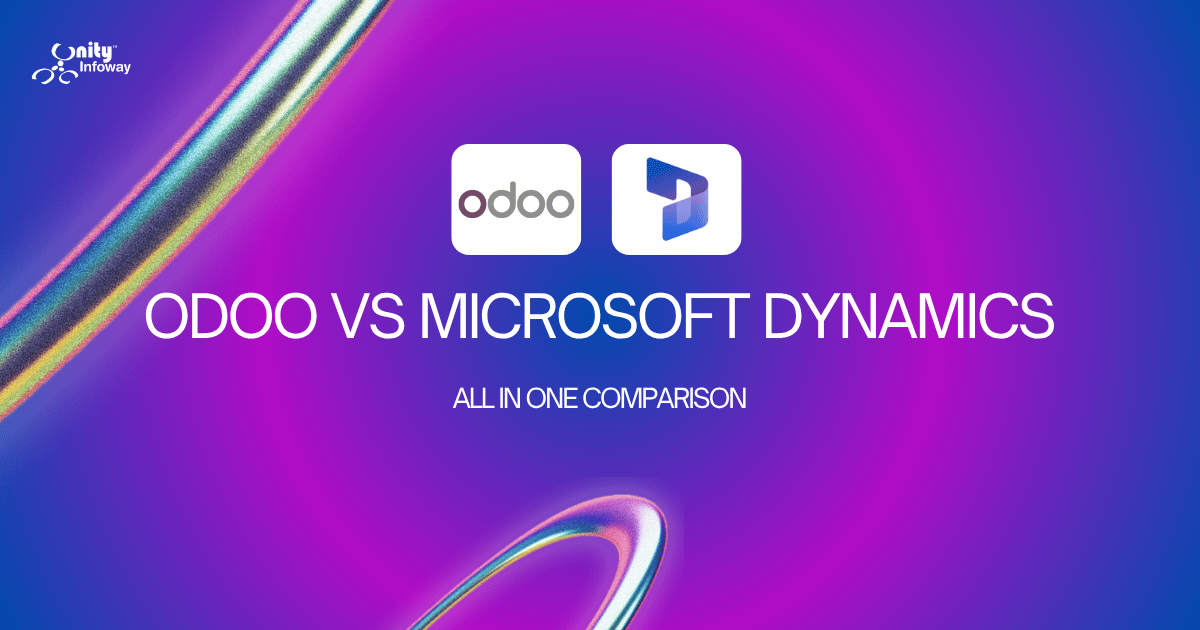When businesses think about upgrading their software, ERP systems like Odoo and Microsoft Dynamics often come up as top choices. In this detailed comparison of Odoo vs Microsoft, we’ll help you understand which solution might work best for your company in 2025. We’ll look at everything from features and pricing to user experience and scalability—using simple, human-friendly language based on real use cases.
What Is Odoo?
Odoo is an all-in-one open-source ERP platform that helps businesses manage everything from inventory and accounting to CRM and HR. It’s known for its modular approach, where you can start small and add more features as your business grows. Odoo is especially popular among startups and mid-sized businesses looking for flexibility without breaking the bank.
What Is Microsoft Dynamics?
Microsoft Dynamics (now offered mainly as Dynamics 365) is a powerful suite of business applications that integrates with other Microsoft services like Office 365 and Azure. It’s designed with large enterprises in mind, offering tools for finance, sales, customer service, supply chain, and more. Microsoft Dynamics is widely used by corporations needing robust, cloud-based business management software.
Odoo vs Microsoft: Feature Comparison
Core Features
| Feature | Odoo | Microsoft Dynamics |
|---|---|---|
| Accounting & Finance | Yes | Yes |
| CRM | Yes | Yes |
| Inventory Management | Yes | Yes |
| HR & Payroll | Yes | Yes (HR module paid) |
| Manufacturing (MRP) | Built-in | Advanced with licensing |
| Customization | Highly customizable | Customizable with consultants |
| E-commerce Integration | Native | Limited unless integrated |
Verdict:
Odoo is more flexible out-of-the-box, especially for smaller operations. Microsoft Dynamics is more suitable if you already use other Microsoft services or need deep enterprise-level features.
Pricing: Odoo vs Microsoft
Odoo Pricing
Odoo offers two options:
Odoo Community – Free and open-source
Odoo Enterprise – Paid version, starts at around $25/user/month with added support and cloud hosting
You pay for only the apps you use, which makes it cost-effective for small businesses.
Microsoft Dynamics Pricing
Microsoft Dynamics 365 has different plans depending on the app:
Sales, Customer Service, Finance, etc. – Starting from $65 to $180/user/month
Additional integration and consulting often required
Verdict:
Odoo is significantly more affordable, especially if you choose the Community edition. Dynamics costs more but comes with enterprise-grade features and support.
User Experience and Interface
Odoo has a clean, modern interface. It’s easy for teams to learn and works well on web and mobile.
Microsoft Dynamics feels similar to other Microsoft tools but can be complex for new users.
Verdict:
Odoo is more beginner-friendly. Dynamics is better if your team is already using Microsoft tools.
Customization and Flexibility
Odoo is open-source, meaning you can tweak everything. Many developers support it.
Microsoft Dynamics offers flexibility, but customization often needs certified partners.
Verdict:
Odoo gives you more control. Microsoft Dynamics offers depth but can be rigid without consultants.
Integration and Ecosystem
Odoo integrates with third-party apps like Shopify, WooCommerce, and payment gateways.
Microsoft Dynamics naturally integrates with Office 365, Teams, SharePoint, Power BI, and Azure.
Verdict:
If you’re invested in Microsoft’s ecosystem, Dynamics will be more seamless. Otherwise, Odoo is more flexible.
Scalability and Performance
Both systems scale well:
Odoo supports thousands of users if hosted properly.
Microsoft Dynamics is built for high scalability in large organizations.
Verdict:
For large enterprises, Dynamics is the safer bet. For startups and SMEs, Odoo is perfect.
Support and Community
Odoo has a huge open-source community, active forums, and paid support options.
Microsoft Dynamics offers enterprise support and a vast partner network.
Verdict:
Odoo wins on community and affordability. Microsoft leads with formal support and partnerships.
Odoo vs Microsoft Dynamics: Pros and Cons
Odoo Pros
Lower cost, even free
Flexible and open-source
User-friendly interface
Modular—add features as needed
Odoo Cons
Requires tech knowledge for customization
Fewer enterprise integrations out-of-the-box
Microsoft Dynamics Pros
Seamless with Microsoft tools
High security and compliance
Rich features for large companies
Excellent enterprise support
Microsoft Dynamics Cons
Expensive licensing
Complex to set up and manage
Overkill for small businesses
Real-Life Use Cases
Odoo: Used by small-to-mid-size companies in retail, manufacturing, healthcare, and tech startups. Ideal for businesses with tight budgets and fast growth needs.
Microsoft Dynamics: Trusted by banks, multinational companies, and government organizations for end-to-end enterprise operations.
Which One Should You Choose?
It depends on your business size, budget, and tech stack:
Choose Odoo if you’re a growing business that values affordability, flexibility, and quick setup.
Choose Microsoft Dynamics if you’re an enterprise needing advanced features, deep integrations, and large-scale operations.
Conclusion
Both Odoo and Microsoft Dynamics are powerful ERP tools—but they serve different needs. Odoo is perfect for agile businesses looking to save on costs without compromising features. Microsoft Dynamics is best for large corporations that already use Microsoft’s ecosystem and require complex business processes.
Still unsure? Start small with Odoo and scale up—or explore Dynamics if you need enterprise-grade control from day one. The right ERP can transform your business, so choose based on what truly fits your workflow, budget, and future goals.
FAQs
Is Odoo really free to use?
Yes, the Community version is completely free and open-source. You’ll pay only for hosting or support if needed.
Which is better for small businesses: Odoo or Microsoft Dynamics?
Odoo is more affordable, easier to set up, and flexible—making it ideal for small to mid-size businesses.
Does Microsoft Dynamics work without Office 365?
Yes, but you’ll get the most out of Dynamics if you also use Office 365, Teams, and other Microsoft services.
Can I customize Odoo without coding?
Basic customization is easy, but deep changes require some developer knowledge or professional help.
Which has better support: Odoo or Microsoft Dynamics?
Microsoft offers premium enterprise support. Odoo has strong community support and affordable paid plans.
Can I migrate from Odoo to Microsoft Dynamics later?
Yes, migration is possible but requires planning and data transformation.
Is Microsoft Dynamics cloud-based?
Yes, Microsoft Dynamics 365 is fully cloud-based and also supports hybrid deployments.


